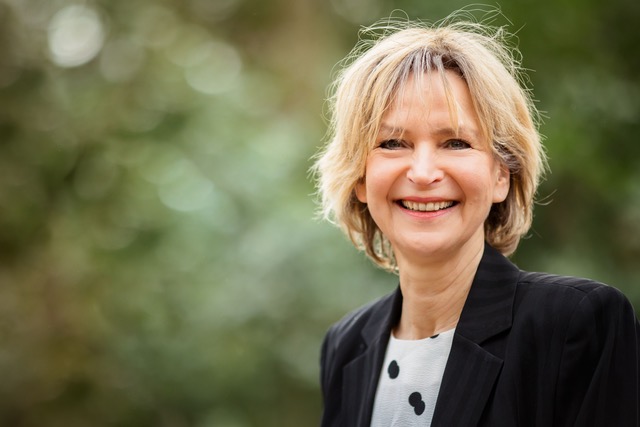Interview with GMW alumna Alice Vlottes: From ‘unemployable’ to popular narcissism expert
Alice Vlottes studied developmental psychology in the 1980s and is now a narcissism expert. She wrote two books on the subject, helps people dealing with narcissism and is also a much sought-after speaker and trainer.
Text: Beau Oldenburg

How did your interest in this topic develop?
"It actually started from my personal experience. I came out of a relationship where things were happening that I didn't understand, which confused me. When I left the relationship, the penny dropped: my ex was a narcissist! Some time later a fellow psychologist suggested to write a book about my experiences. This was exactly the push I needed. Because I had already thought so much about the subject, the book "Narcissism in Relationships" rolled out of my fingers almost naturally. Not long after that, I wrote book number two, 'Narcissism in Organizations'."
Did you always want to write books?
"No, not at all! I could never have imagined writing two books. And certainly not on a subject like this. When I completed my studies in developmental psychology in the 1980s, it was a difficult time to get a job. The 'arbeidsbureau' (ed. the Dutch employment agency) even labelled me 'unemployable' when they heard that I had studied psychology. I'll never forget that, it was so shocking. Fortunately I managed to find a temporary job as a school counselor in secondary education through my own network. Nowadays I work one day a week at a psychology institute. People from all over the country and even from Belgium contact me. Besides that I give lectures and trainings about narcissism."
How do you help people dealing with narcissism?
"I mainly focus on people who have a narcissist around them. Those suffer the most, I find. In the beginning narcissists are very nice and seem empathetic, but gradually they make you believe that you are worth nothing and can't do anything. You start to doubt yourself enormously. With my books and therapy I hope to make these people a little stronger and more secure, to give them tools. A reaction that I hear a lot is: 'So I'm not crazy after all!
Do you also treat people who have a narcissistic disorder themselves?
"Almost not. If narcissists seek help at all, it is a very long process. Narcissists have little self-reflection and usually don't take psychologists seriously."
It is often said that with narcissists there is little chance of improvement and that therefore the best thing you can do is to break contact. How do you feel about that?
“That is an advice you often hear, yes. Although it is ultimately the best thing for you, I find it a bit easy to say because you don't always have that option. You might, for instance, be financially dependent. Partners of narcissists are often completely trapped in a web, disconnected from friends or family. I teach them how to best deal with narcissists."
It seems like narcissism is more prevalent now than in the past. Is that true?
"Yes, that has to do with two things. Narcissistic behavior is very much encouraged in our society. People who are modest or shy are noticed less than loud people. And in addition, there has been a shift in the roles of men. In the 1950s and 1960s, men had to be dominant and confident; that was part of their role as a director or head of the family. Nowadays we value other things, such as talking to each other, listening and being able to take criticism. So what used to be tolerated, we now tolerate less. As a result, certain behaviour stands out."
At the same time, nowadays people are perhaps too quickly called narcissists?
"Certainly, it's used a lot as a swear word, like 'borderliner'. When women react emotionally, they are quickly dismissed as borderliners. Men we disagree with are 'narcissists'. Dutch celebrities are also too quickly given this label. Some people, for example, say that our prime minister Rutte is a narcissist. I don't see that myself. It could be that he has become a bit more authoritarian over the years, but you often see that in people who have been in power for a long time."
Comments or questions about this article? Please contact the department of Communication, Marketing and Information.
| Last modified: | 09 February 2022 1.43 p.m. |
More news
-
17 December 2024
Autism in women: masking takes its toll
Women with autism are often diagnosed later than men. Researcher Yvonne Groen developed a screening tool together with her colleagues to simplify the diagnosis.
-
26 November 2024
The fear of eating
Renate Neimeijer conducts research into eating disorders among children and young adults. Her current research focuses on ARFID: avoidant/restrictive food intake disorder.
-
05 November 2024
Do parents have any influence on whether their children wear 'pink' or 'grey' glasses?
How does a positive outlook actually develop? How important is upbringing in this regard? And what kind of role does optimism actually play in the daily lives of parents and children? Charlotte Vrijen is trying to find an answer to these questions....


